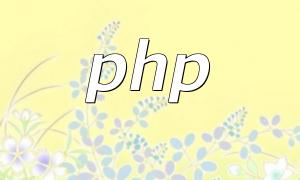In PHP development, the echo() function is often seen as a basic output tool, but it actually plays a much more critical role. It contributes significantly to code readability, performance optimization, and output security.
echo() is one of the most commonly used output constructs in PHP. It allows developers to send strings, variables, and other data to the browser. As a language construct rather than a function, it provides a syntactically simple and efficient method of output.
The syntax for using echo() is straightforward:
echo "Hello, World!";This line of code will display “Hello, World!” in the browser.
Because echo() is a language construct and does not return a value, it avoids the overhead of function calls. This makes it more efficient than alternatives like print(), especially when outputting large volumes of data.
One notable feature of echo() is its ability to accept multiple parameters, separated by commas. This makes it easier to output several strings without concatenation:
echo "Hello", " ", "World", "!";This will output “Hello World!”. It's a clean and efficient way to handle multiple strings.
When displaying user-submitted input, it's essential to prevent Cross-Site Scripting (XSS) attacks. Using htmlspecialchars() to sanitize output is a best practice:
$user_input = "alert('XSS');";
echo htmlspecialchars($user_input);This code safely displays the user's input without executing it as a script, thus protecting your application from XSS vulnerabilities.
Although echo() may appear to be a basic PHP construct, its impact on performance, readability, and security should not be underestimated. By mastering echo() and using it wisely, developers can write cleaner, faster, and more secure code. It’s a foundational skill for every PHP developer.









